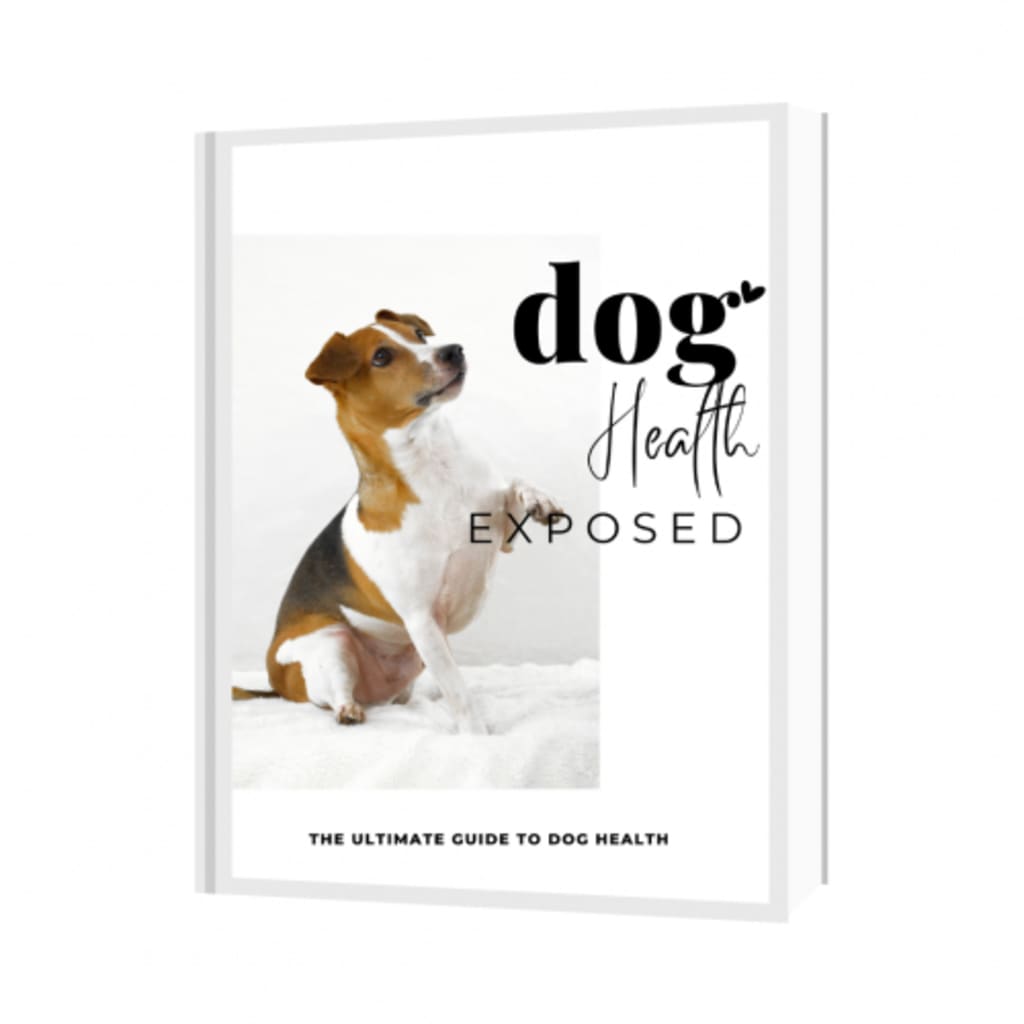"The ULTIMATE Guide to DOG Health"
✓ Understand ingredients ✓ Vitamin and mineral supplements ✓ Boredom and variety ✓ Homemade diets ✓ Food allergies ✓ Signs of illness and others 29

Introduction:
As dog owners, we strive to provide the best care and ensure the well-being of our beloved furry friends. Just like humans, dogs require proper attention, a balanced diet, regular exercise, grooming, vaccinations, and preventive healthcare to lead healthy and happy lives. In this ultimate guide, we will explore essential aspects of dog health, including nutrition, exercise, grooming, vaccinations, common health issues, and understanding ingredients. By following these comprehensive guidelines, you can give your four-legged companion the best chance at a long and vibrant life.
Nutrition:
A well-balanced diet is the foundation of good health for dogs. Understanding the ingredients in their food is crucial. Here are some key points to consider when it comes to canine nutrition:
Read and Understand Ingredients:
Familiarize yourself with the ingredients listed on your dog's food label. Look for high-quality protein sources like meat, fish, or poultry as the first ingredient.
Avoid foods containing fillers, by-products, or artificial additives. Opt for natural and wholesome ingredients.
Be cautious of common allergens such as corn, wheat, soy, and dairy, which can cause digestive issues or allergic reactions in some dogs.
Research and consult with your veterinarian to determine the best food options for your dog's specific dietary needs.
Vitamin and Mineral Supplements:
While a balanced diet should provide essential nutrients, some dogs may benefit from vitamin and mineral supplements.
Consult your veterinarian before adding any supplements to your dog's diet. They can recommend specific supplements based on your dog's individual requirements.
Boredom and Variety:
Dogs, like humans, appreciate variety in their diet. Rotate different flavors or brands of high-quality dog food to keep mealtime interesting.
Introduce new foods gradually to prevent digestive upset. Sudden changes in diet can cause stomach issues.
Homemade Diets:
Homemade diets can be an option, but they require careful planning and consultation with a veterinary nutritionist.
Ensure the homemade diet meets your dog's nutritional needs and includes a balanced combination of proteins, carbohydrates, fats, vitamins, and minerals.
Food Allergies:
Dogs can develop allergies to certain foods, resulting in digestive problems, skin irritations, or other health issues.
If you suspect your dog has a food allergy, consult your veterinarian for proper diagnosis and guidance on an elimination diet or alternative food options.
Exercise:
Regular exercise is crucial for maintaining your dog's physical and mental well-being. Here are some exercise tips:
Daily Exercise:
Engage in daily walks or play sessions to keep your dog active and prevent weight gain.
The duration and intensity of exercise depend on your dog's breed, age, and health condition. Some dogs require more vigorous activities, while others may prefer shorter, gentler exercises.
Mental Stimulation:
Mental stimulation is as important as physical exercise. Incorporate puzzle toys, obedience training, or interactive games to keep your dog's mind sharp.
Provide your dog with opportunities to explore new environments, meet other dogs, and engage in social interactions.
Weather Considerations:
Be mindful of your dog's limitations and avoid excessive exercise, especially in extreme weather conditions. Hot pavement, icy surfaces, or high humidity can pose risks to your dog's health.
Adjust exercise routines accordingly and provide indoor activities during extreme weather conditions.
Grooming:
Proper grooming not only keeps your dog looking their best but also contributes to their overall health. Consider the following grooming practices:
Regular Brushing:
Regularly brush your dog's coat to remove loose fur and prevent matting. Brushing also stimulates the skin and distributes natural oils for a healthier coat.
The frequency of brushing depends on your dog's coat type. Long-haired dogs may require daily brushing, while short-haired breeds may only need brushing once or twice a week.
Use appropriate brushes or combs for your dog's specific coat type to effectively remove tangles, debris, and loose hair.
Regular brushing also allows you to inspect your dog's skin for any signs of irritation, ticks, fleas, or other skin issues.
Bathing:
Bathe your dog as needed, using dog-specific shampoos that maintain their natural oils and pH balance.
The frequency of bathing varies depending on your dog's breed, coat condition, and lifestyle. Over-bathing can strip the skin of essential oils, leading to dryness and irritation.
Use lukewarm water and ensure that all shampoo residue is rinsed off thoroughly.
Nail Care:
Trim your dog's nails regularly to prevent discomfort and potential injuries. Long nails can affect your dog's gait and cause pain.
If you are unsure about nail trimming, consult a professional groomer or veterinarian for guidance.
Take care not to cut the quick, the sensitive area within the nail. If you accidentally cut the quick and it bleeds, apply styptic powder or cornstarch to stop the bleeding.
Ear Care:
Clean your dog's ears regularly to prevent ear infections and check for any signs of redness, discharge, or foul odor.
Use a veterinarian-recommended ear cleaning solution and gently wipe the visible parts of the ear with a clean, soft cloth or cotton ball.
Avoid inserting anything deep into the ear canal, as it can cause injury. If you notice any signs of infection or discomfort, consult your veterinarian.
Dental Care:
Dental hygiene is vital for your dog's overall health. Poor dental care can lead to gum disease, tooth decay, and even systemic health issues.
Brush your dog's teeth regularly using a dog-specific toothbrush and toothpaste. Start gradually and make it a positive experience for your dog.
Offer dental chews or toys that promote chewing and help clean their teeth. Regular dental check-ups and professional cleanings are also important for maintaining oral health.
Vaccinations and Preventive Care:
Protecting your dog from preventable diseases is crucial. Here's what you need to know:
Vaccinations:
Consult with your veterinarian to establish a vaccination schedule tailored to your dog's specific needs. Core vaccines, including rabies, distemper, parvovirus, and adenovirus, are essential for most dogs.
Stay up to date with booster shots as recommended by your veterinarian to maintain immunity against diseases.
Preventive Medications:
Regularly administer preventive medications for fleas, ticks, heartworm, and intestinal parasites. These pests can cause significant health problems and discomfort for your dog.
Consult your veterinarian for the most appropriate preventive medications based on your dog's age, lifestyle, and geographical location.
Wellness Exams:
Schedule routine wellness exams with your veterinarian to monitor your dog's overall health and address any concerns promptly.
Regular check-ups allow early detection of potential health issues, ensuring timely intervention and treatment.
Common Health Issues:
Despite our best efforts, dogs may still encounter certain health issues. Being aware of common conditions can help you take appropriate action:
Signs of Illness:
Learn to recognize signs of illness in your dog, such as changes in appetite, weight loss or gain, lethargy, excessive thirst, coughing, vomiting, diarrhea, or abnormal behavior.
If you notice any concerning symptoms, consult your veterinarian promptly for a proper diagnosis and treatment.
Allergies and Skin Issues
Dogs can develop allergies to certain foods, environmental factors (pollen, dust mites), or substances they come into contact with (such as certain cleaning products or fabrics).
Allergies can manifest as itching, redness, rashes, hot spots, ear infections, or gastrointestinal issues.
If you suspect your dog has allergies, your veterinarian can perform tests to identify the allergens and recommend an appropriate management plan, which may include dietary changes, medication, or environmental modifications.
c. Joint Problems and Arthritis:
Dogs, especially older ones or those with certain breeds predisposed to joint issues, may develop arthritis or other joint problems.
Signs of joint problems include difficulty moving, stiffness, limping, reluctance to jump or climb stairs, or changes in behavior.
Consult your veterinarian for appropriate pain management, joint supplements, and lifestyle modifications to improve your dog's comfort and mobility.
d. Dental Issues:
Dental problems are common in dogs and can lead to pain, tooth loss, and systemic health issues.
Regular dental care, including brushing, dental chews, and professional cleanings, is essential for maintaining good oral hygiene.
Signs of dental issues include bad breath, inflamed gums, tartar buildup, difficulty eating, or pawing at the mouth. Consult your veterinarian if you notice any of these signs.
e. Obesity:
Obesity is a significant health concern for dogs and can lead to various problems, including joint issues, diabetes, heart disease, and a shorter lifespan.
Maintain a healthy weight for your dog through portion control, balanced nutrition, and regular exercise.
If your dog is overweight, consult your veterinarian for a weight management plan that includes a tailored diet and exercise routine.
Conclusion:
Caring for your dog's health requires dedication, knowledge, and regular veterinary care. By following the comprehensive guidelines outlined in this ultimate guide, you can provide your canine companion with optimal nutrition, exercise, grooming, preventive care, and early intervention for potential health issues. Remember, each dog is unique, so consult your veterinarian for personalized advice to ensure a long, happy, and healthy life for your beloved four-legged friend.





Comments
Mahnoor Malik is not accepting comments at the moment
Want to show your support? Send them a one-off tip.